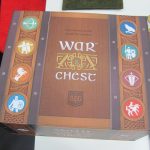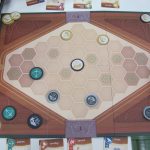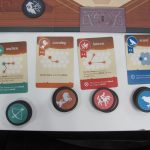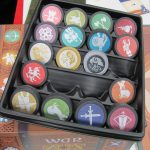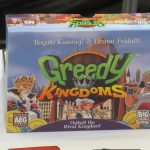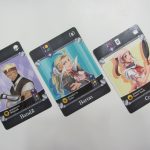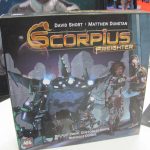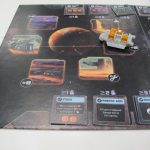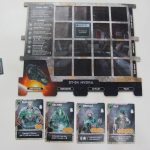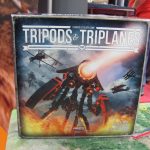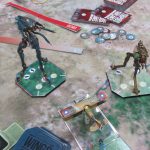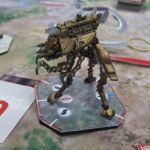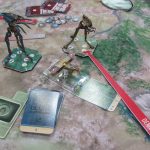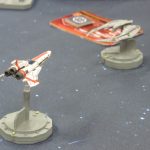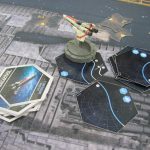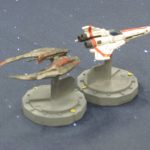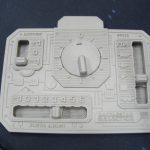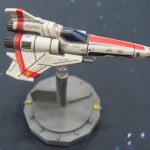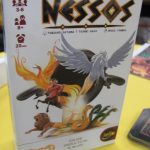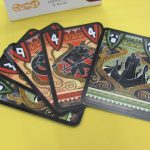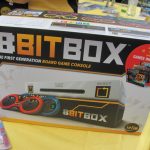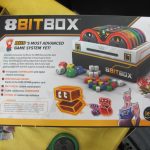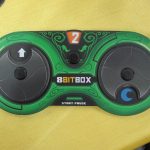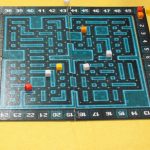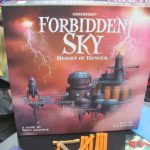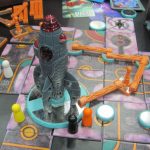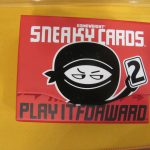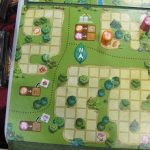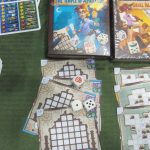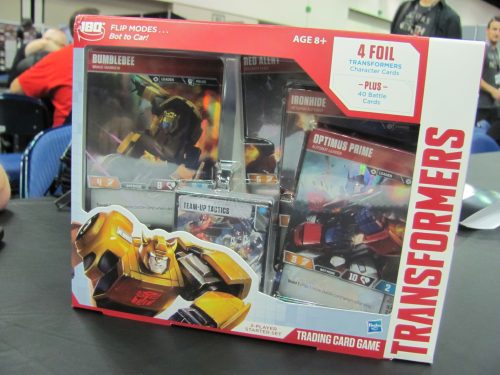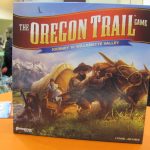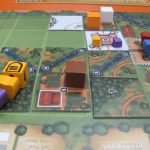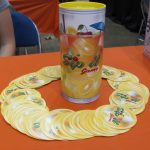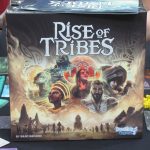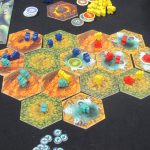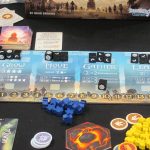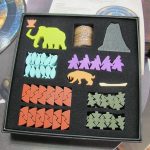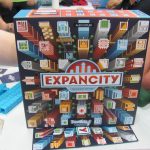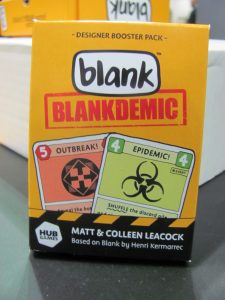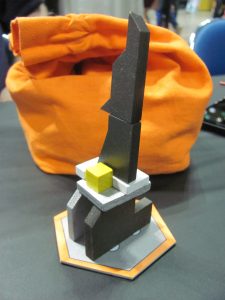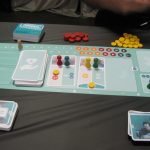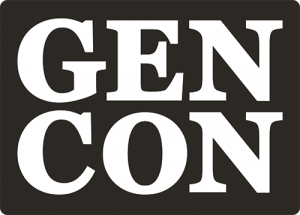 Debuting at the show for AEG was War Chest ($50), a war-themed abstract strategy game with what they call a bag-building element. Like the quintessential game in this category, Chess, each type of piece moves and fights in a different way. But rather than trying to capture opposing pieces, the goal here is to control a set of board spaces. Also, the pieces themselves are Poker chips (nice heavy, solid ones too). An important part of the game is choosing which pieces to put in the bag, because only those drawn from the bag can be activated and moved on the board.
Debuting at the show for AEG was War Chest ($50), a war-themed abstract strategy game with what they call a bag-building element. Like the quintessential game in this category, Chess, each type of piece moves and fights in a different way. But rather than trying to capture opposing pieces, the goal here is to control a set of board spaces. Also, the pieces themselves are Poker chips (nice heavy, solid ones too). An important part of the game is choosing which pieces to put in the bag, because only those drawn from the bag can be activated and moved on the board.
Hitting retail later this month will be Greedy Kingdoms ($25), a bluffing and resource collection game for AEG’s Big in Japan line. The goal in Greedy Kingdoms is to build palaces. Each turn, players select and reveal three of nine character cards simultaneously. Any that match are blocked. Those that aren’t produce resources, which can be used to build, buy upgrades, and even upgrade character cards.
Planned for an Essen release is Scorpius Freighter. This one’s about smuggling in a science-fiction setting and has players upgrading their ships, hiring crew, and taking on contracts. Moving one of the central ship pieces is what allows a player to do something with their own ship. But for each rotation that central ship makes, a cargo piece is added to its hold, and when that hold is full, the government will clamp down on smuggling and the game is over.
- Comments Off on Gen Con 2018—AEG
 This fall, Ares Games will begin shipping Tripods & Triplanes, an alternate-history miniatures game compatible with Wings of Glory. The game supposes an alien invasion of Earth during the waning days of World War I. The airplanes (same as those from Wings of Glory) are more agile but the alien mechs have powerful lasers. Starter sets will retail for $50.
This fall, Ares Games will begin shipping Tripods & Triplanes, an alternate-history miniatures game compatible with Wings of Glory. The game supposes an alien invasion of Earth during the waning days of World War I. The airplanes (same as those from Wings of Glory) are more agile but the alien mechs have powerful lasers. Starter sets will retail for $50.
Later this winter, Ares will launch Battlestar Galactica Starship Battles. Starter sets with two Colonial Vipers (painted for individual pilots) and two Cylon Raiders should retail for $50-60. Of course, additional ships, including Basestars and Battlestars will come later. For each ship, there’s also a small plastic “controller” to track altitude, kinetic energy, and speed. Space combat in this game includes momentum.
- Comments Off on Gen Con 2018—Ares Games
 Highlights from Iello’s booth at Gen Con include Nessos and 8 Bit Box.
Highlights from Iello’s booth at Gen Con include Nessos and 8 Bit Box.
Nessos ($15, Q4) is a bluffing card game for up to six players with a Greek mythology theme. One player passes to the next a single card face down. If it’s a red creature card, they must correctly name the creature and card value. If it’s a green Charon card, though, they have to lie. The receiving player, then, has three choices (before looking). They can accept the card (and flip it over); they can return it (in which case, the first player flips it over); or they can pass it, along with a card of their own. The first player to 30 points is the winner but a player with three green cards is out.
8 Bit Box ($40, Q4) is something Iello is calling a “board game console.” Inspired by early video games, 8 Bit Box provides a set of “controllers” (dual cardboard dials) for use with a series of individual games. Included with the base box are the game modules Outspeed (a racing game), Pixoid (similar to Pac Man), and Stadium (team racing). There’s also room in there for seven additional games.
- Comments Off on Gen Con 2018—Iello
 At Gen Con, Gamewright debuted Forbidden Sky ($40), a much-anticipated sequel to Forbidden Island and Forbidden Desert. Also a cooperative game, Forbidden Sky is set on a platform floating in a storm. While the winds blow their pawns about, the players must construct a circuit to bring power from lightning rods to an escape rocket. The game is electrified, the circuit is real, and the rocket lights up when the players succeed.
At Gen Con, Gamewright debuted Forbidden Sky ($40), a much-anticipated sequel to Forbidden Island and Forbidden Desert. Also a cooperative game, Forbidden Sky is set on a platform floating in a storm. While the winds blow their pawns about, the players must construct a circuit to bring power from lightning rods to an escape rocket. The game is electrified, the circuit is real, and the rocket lights up when the players succeed.
Other recent additions to the Gamewright’s lineup include Sneaky Cards 2 ($10), with more actions to play on the street and with strangers, This Game Goes to Eleven ($15, Target exclusive), a family game of sticking others with your cards, and Trash Pandas ($13), a push-your-luck game, where the players are raccoons collecting scraps from garbage cans.
- Comments Off on Gen Con 2018—Gamewright
 In October, Dude Games is coming out with Kids Magic Maze ($50), a fast-play cooperative game where the goal is to collect a set of potion ingredients but each player can move the game pawns only in one direction along the map-board paths.
In October, Dude Games is coming out with Kids Magic Maze ($50), a fast-play cooperative game where the goal is to collect a set of potion ingredients but each player can move the game pawns only in one direction along the map-board paths.
Also in October, the company is shipping three versions of Penny Papers Adventures roll-and-write games ($20 each). All share essential mechanisms but with graduating difficulty levels from The Temple of Apikhabou to Skull Island to Valley of Wiraqocha.
- Comments Off on Gen Con 2018—Dude Games
 At Gen Con, I had the opportunity to sit down with WOTC Brand Manager Drew Nolosco for some background on the Transformers TCG. We didn’t discuss so much rules of play, mind you, but more design philosophy for the game. I’m impressed by the thought process that went in to it and expect that fans of the property will find that the game delivers a solid Transformers experience. The Transformers TCG is a head-to-head battle game, for sure, but the focus is clearly on characters. Every Transformer character card is oversized, foiled, and two-sided, one for bot mode and one for alt mode. The remaining battle cards provide tactics and upgrades for a player’s chosen Transformers team.
At Gen Con, I had the opportunity to sit down with WOTC Brand Manager Drew Nolosco for some background on the Transformers TCG. We didn’t discuss so much rules of play, mind you, but more design philosophy for the game. I’m impressed by the thought process that went in to it and expect that fans of the property will find that the game delivers a solid Transformers experience. The Transformers TCG is a head-to-head battle game, for sure, but the focus is clearly on characters. Every Transformer character card is oversized, foiled, and two-sided, one for bot mode and one for alt mode. The remaining battle cards provide tactics and upgrades for a player’s chosen Transformers team.
In the first wave, the 40 character cards total do include some of the rarer Transformers. And despite their unusual size for CCG packaging, every booster will have one character card.
Another WOTC goal with the Transformers TCG was to create a game for intergenerational play. The basic rules and goals—to KO all an opponent’s characters—were developed for children as young as 8, while still supporting more complex card-playing strategies for older players. The game allows for strategic play in defense as well as offense. And the rarity system was not only designed to make it easier to collect a broader range of characters, it also features a type of graduated complexity. That is, the more complex game rules only come in to play on rarer cards, thus easing people in to more advanced play.
WOTC is planning for some Transformers TCG events but not for much of a tournament scene.
While limited sales took place at Gen Con and San Diego Comic Con, full retail release is scheduled for September 28th. Starter Sets will come with four character cards and 40 battle cards for $15, boosters one character and seven battle cards for $4. There will also be a mobile companion app to assist with building teams and tracking damage.
I’m told also that putting the characters on oversized cards allows for experimentation. So look out for some possibly even larger or unusually shaped cards in future releases.
- Comments Off on Gen Con 2018—Designer Perspective on Transformers TCG
 Five new games from Goliath but one is not like the others…
Five new games from Goliath but one is not like the others…
The Oregon Trail Game: Journey to Willamette Valley ($40, available now exclusively at Target) is the third of Goliath/Pressman’s titles based on the classic computer game. This one has players laying out trail tiles, hunting, trading supplies, selling goods, and moving their wagons across the board. Along the way, they must endure various calamities and, of course, always keep their families fed. The winner is the player who reaches Willamette Valley with the most money. Family members who die en-route drain a player’s resources. The earlier in the journey, the more it costs to bury them.
50 Shades of Shit ($20, due this fall) is an expansion for the company’s Shit Happens party game and is focused on sexual situations.
Tossed Salad ($15, now) is a word-guessing party game of double entendres. In the first round, those giving the hints can say anything. In the second round, they can use at most three words. And in the third round, they can use only Charades-like motions.
Friend or Faux ($20, now) is more a get-to-know-you activity that involves asking revealing questions. In rounds four and five, the questions get more adult.
Sip It ($20, fall) is a card-based drinking game. Some of the cards are truth-or-dare like; others have action challenges.
- Comments Off on Gen Con 2018—Goliath Games
 Making their way in to retail over the next month from Breaking Games are Rise of Tribes and Expancity.
Making their way in to retail over the next month from Breaking Games are Rise of Tribes and Expancity.
Rise of Tribes ($50 + $25 for a deluxe component upgrade) is a somewhat abstracted civilization building game that plays in about an hour. Four actions are always available on a person’s turn: grow, move, gather, and lead. But how effective those actions would be are determined by dice rolled by the player at the beginning of their turn, as well as dice held over from previous players’ turns. Points are scored by completing goal cards and building villages. The first to 15 is the winner.
Expancity ($60) is a city building game with a striking table presence. Players add tiles to the city both as locations for new buildings and as modifiers for adjacent buildings. The buildings are made by stacking plastic pieces vertically and then capping them off to score. The result is a table that looks like a downtown area packed with high-rises.
- Comments Off on Gen Con 2018—Breaking Games
 Besides Holding On at Essen Spiel, Hub Games will be releasing Blankdemic, a small expansion ($6) meant to showcase the flexibility of the company’s customizable card game, Blank. Blankdemic cards, designed by Matt and Colleen Leacock, provide a more tactical game experience and are obviously inspired by Matt’s earlier board game, Pandemic.
Besides Holding On at Essen Spiel, Hub Games will be releasing Blankdemic, a small expansion ($6) meant to showcase the flexibility of the company’s customizable card game, Blank. Blankdemic cards, designed by Matt and Colleen Leacock, provide a more tactical game experience and are obviously inspired by Matt’s earlier board game, Pandemic.
Then for the UK Games Expo, Hub is planning Mega Cities, which combines Euro-style and dexterity elements in a city-building game. The goal, to satisfy certain building contracts, is accomplished by stacking odd-shaped pieces, made from a variety of materials, over foundation spots marked on platform tiles. To score, players must slide their tiles across the table, over to the city, without knocking down their buildings.
- Comments Off on Gen Con 2018—Hub Games
 This game is something else! I saw many fun games at Gen Con but Holding On: The Troubled Life of Billy Kerr from Hub Games pairs gameplay with a meaningful experience, such as I haven’t seen before.
This game is something else! I saw many fun games at Gen Con but Holding On: The Troubled Life of Billy Kerr from Hub Games pairs gameplay with a meaningful experience, such as I haven’t seen before.
At the basic level, Holding On is a cooperative worker-placement game, where the players manage hospital staff as they work with heart-attack patient Billy Kerr.
At a deeper level, though, gameplay presents the opportunity to learn something about modern medical care. Each game round represents 1 day and consists of three work shifts. During each shift, the players have to decide between allocating resources to physical care, addressing Billy’s direct medical needs, and palliative care, making him more comfortable and establishing a closer, trusting relationship with him.
But that’s not what this game is really about. What Holding On is about is the troubled life of Billy Kerr. And that is revealed, slowly, through 10 scenarios, during which the players are able to help the patient recover memories of his earlier life. Partial-memory cards with limited text and hazy images can be replaced with clarifying overlays if the right choices in care are made. And while I wouldn’t (in fact, can’t) spoil the whole story, I can reveal that Billy’s history is a complex one involving The Troubles in Northern Ireland.
The story, I’m told, is based on real facts and paints an honest picture of a complex character.
The game, then, promises to give players a lot to think about.
Holding On: The Troubled Life of Billy Kerr should be available at Essen Spiel for $40.
- Comments Off on Holding On: The Troubled Life of Billy Kerr
Trending
- Massdrop.com
- Oh the Irony—Illuminati Card Game Continues to Inspire Conspiracy Theorists
- Home
- Footprints, an Educational Ecology Game
- USPS Adds Board Game Flat Rate Box
- Baila, the Estonian Drinking Card Game
- Crystal Caste Wins Dice Patent Suit Against Hasbro
- Mirror Game, Red and Blue
- Are Board Games Dangerous?
- The Truth About Dominoes On Sunday in Alabama
Archives
Most Popular Articles
- Oh the Irony—Illuminati Card Game Continues to Inspire Conspiracy Theorists
- The 20 Most Valuable Vintage Board Games
- The Truth About Dominoes On Sunday in Alabama
- Sequence Game, and Variants
- USPS Adds Board Game Flat Rate Box
- Baila, the Estonian Drinking Card Game
- The 13 Most Popular Dice Games
- Are Board Games Dangerous?
- Guess Who? The Naked Version
- What Happened to the Jewel Royale Chess Set?
Recent Posts
- Toy Fair 2019—Breaking Games
- Talisman Kingdom Hearts Edition
- Toy Fair 2019—Winning Moves
- Toy Fair 2019—Games Workshop
- Toy Fair 2019—Star Wars Lightsaber Academy
- Toy Fair 2019—Stranger Things Games
- Toy Fair 2019—HABA
- Licensing Roundup
- Game Bandit
- 2018 A Difficult Year For Hasbro But Not For D&D Or MtG
Recent Comments
- on Toy Fair 2019—Winning Moves
- on Game Bandit
- on Second Look—Dungeons & Dragons Waterdeep Dragon Heist
- on Crowdfunding Highlights
- on Beyblade SlingShock
- on Game Bandit
- on Game Bandit
- on Watch This Game!, the Board Game Review Board Game
- on Second Look—Vampire: The Masquerade 5th Edition
- on Palladium Books Loses Robotech IP License, Cancels Five-Year-Overdue Robotech RPG Tactics Kickstarter

